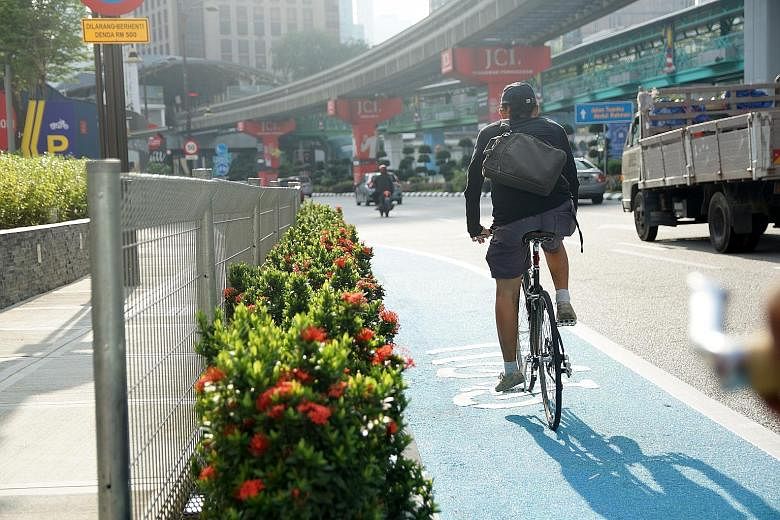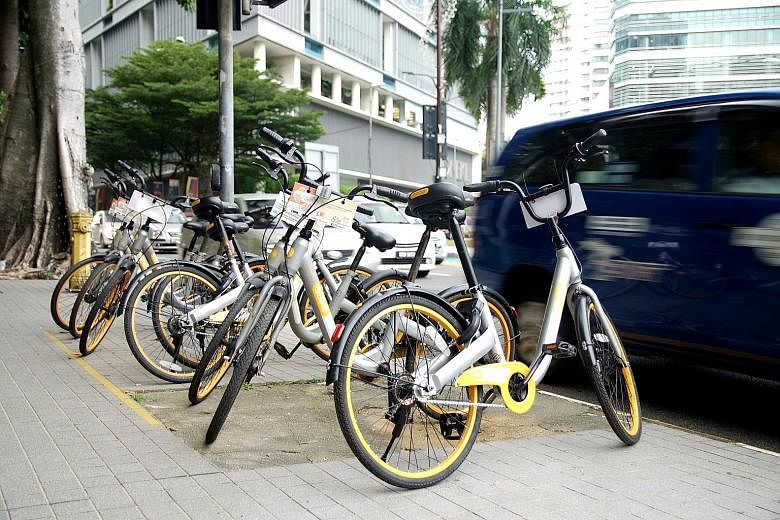The Malaysian capital has introduced a new mode of transport - shared bicycles, complete with 7.2km of blue-lined cycling lanes on which to ride them.
But safety issues and criticism from Kuala Lumpur's six million motorists have led the authorities to review the move, potentially setting back the plan after it has barely begun.
A key concern is safety, both of cyclists and other road users.
Last month, a motorcyclist was injured when his bike ran into dividers on the new cycling lanes. Designed to prevent vehicles from encroaching onto the cycling lanes, the dividers - 40cm long raised rubber strips - are now derided for being road hazards.
City Hall - which introduced the cycling lanes to coincide with the World Urban Forum this month - removed the horizontal rubber strips and replaced them with vertical flexipoles placed at certain sections of the route.
Kuala Lumpur mayor Mohd Amin Nordin Abdul Aziz said last Wednesday that the RM4 million (S$1.3 million) cycling lanes will be audited before City Hall decides whether to reroute or remove parts of them.
In Singapore, bicycles travel on pedestrian walkways, but the dedicated new bicycle lanes in Kuala Lumpur share the public roads with other vehicles, taking up a 1.5m-wide space.
The route loops round the business and shopping district - known as the Golden Triangle - and extends to the Jalan Raja heritage zone. Frequent users of bike-sharing facilities find cycling in the city a challenge, with risks posed by cars, motorbikes and even pedestrians, with whom they occasionally share walkways.
"There's no real cycling culture in Malaysia so motorists aren't used to dealing with cyclists, and that makes it unsafe," said Mr Jason Ng, a business journalist. He usually cycles between the Bukit Bintang MRT station in the city centre and his workplace five minutes away.
Haphazardly parked cars pose another danger.
City Hall's project management executive director Mahadi Che Ngah told The Straits Times: "This is an issue faced by many cities and it is a common scene to find illegally parked vehicles obstructing the bicycle lanes, creating a safety hazard for cyclists."
Kuala Lumpur's experience so far at promoting cycling appears similar to those reported in other urban centres around the world.
New York's plans in 2010 to encourage cycling, for example, were nearly scuppered when protesters objected to narrower lanes for vehicles and having cyclists share the pedestrian walkways. Today, the city boasts some 643km of bike lanes with more than 15 million bike-sharing trips made last year.
Bike-sharing companies began arriving in Malaysia early last year, and the four which established themselves have collectively rolled out more than 11,000 bicycles across several cities in the country apart from Kuala Lumpur. They include Melaka, George Town, Putrajaya, Cyberjaya and Shah Alam.
The four bike-sharing players in Malaysia are Singaporean start-up oBike, Penang's own LinkBike and Chinese companies Mobike and ofo.
Like other countries, Malaysia too suffers the familiar scene of abandoned piles of bikes blighting its cityscape as users enjoy the convenience of picking up a bike and dropping it off anywhere.
Last September, oBike was fined RM17,000 by the Petaling Jaya local council after more than 250 of its ubiquitous yellow bicycles were seized for causing obstruction in public places. Meanwhile, irresponsible people steal or vandalise the shared bicycles, with social media filled with photos of bikes thrown into monsoon drains, kept on private property or missing their seats, handlebars or GPS devices.
Despite these challenges, the move to get people healthier and the environment greener by cycling still has legs. Local councils, like in Subang Jaya, are preparing to draft plans for bike-sharing and cycle lanes.
Bike-sharing companies oBike and Mobike told The Straits Times that infrastructure is crucial.
"Cycling paths and development of cycling routes in town will be an important avenue to provide people with the option of switching to bicycle for the first-and last-mile connectivity," said oBike Malaysia's marketing manager Elaine Chan.
According to cyclist Mr Ng, it is tough to cycle in hot and humid Malaysia. "It's doable if it's no more than 500m. When it's too far, you'll arrive at work all sweaty and tired. This isn't Tokyo or London," he said.
Tropical downpours are another obstacle, with few sheltered pathways in the city.
But keen cyclists see the introduction of cycling lanes as a good start for more improvements to follow.
"There isn't much cycling infrastructure in the region but we are now introducing it in KL," said cycling advocate Jeffrey Lim. "Weather isn't the biggest issue. We can always plan our life around it".


